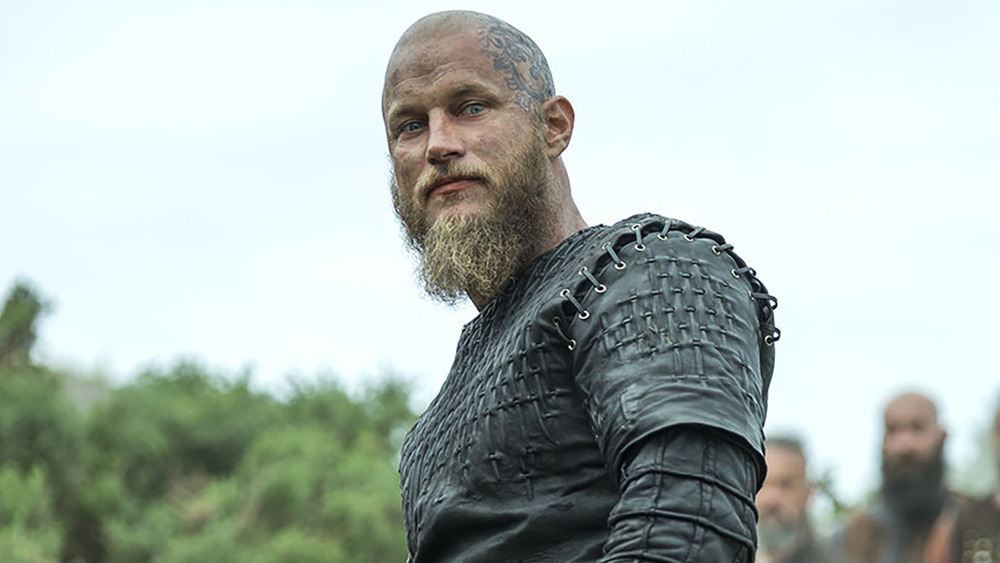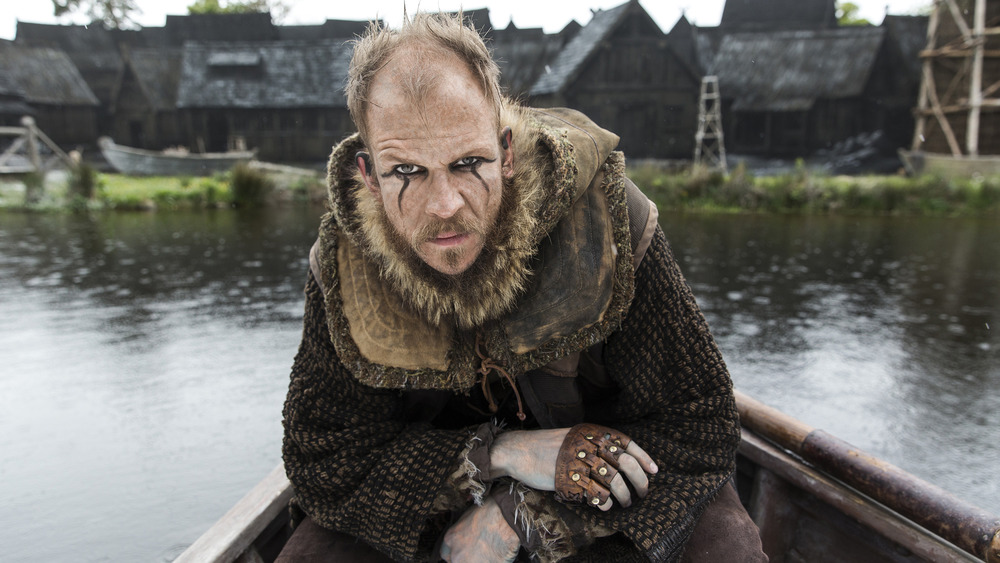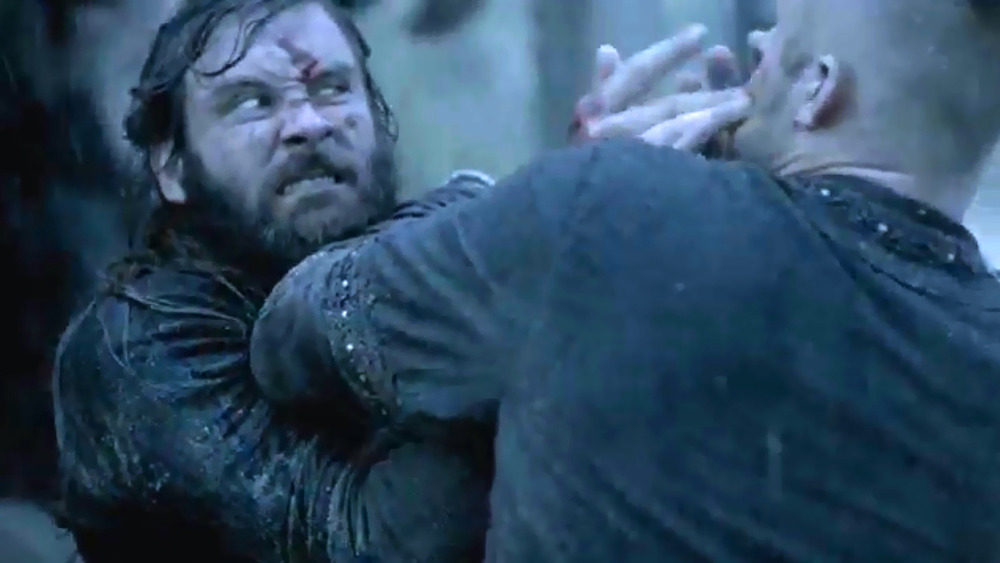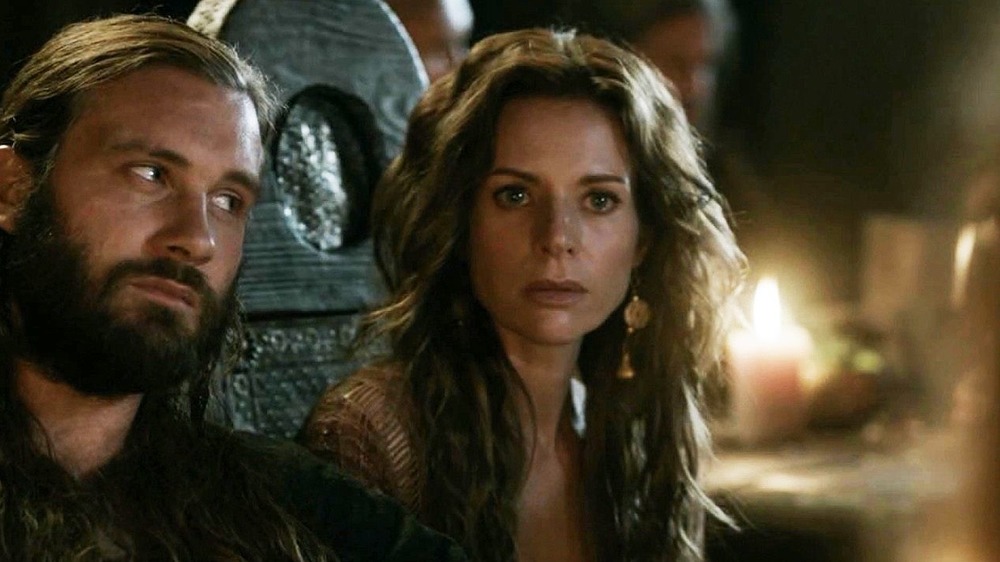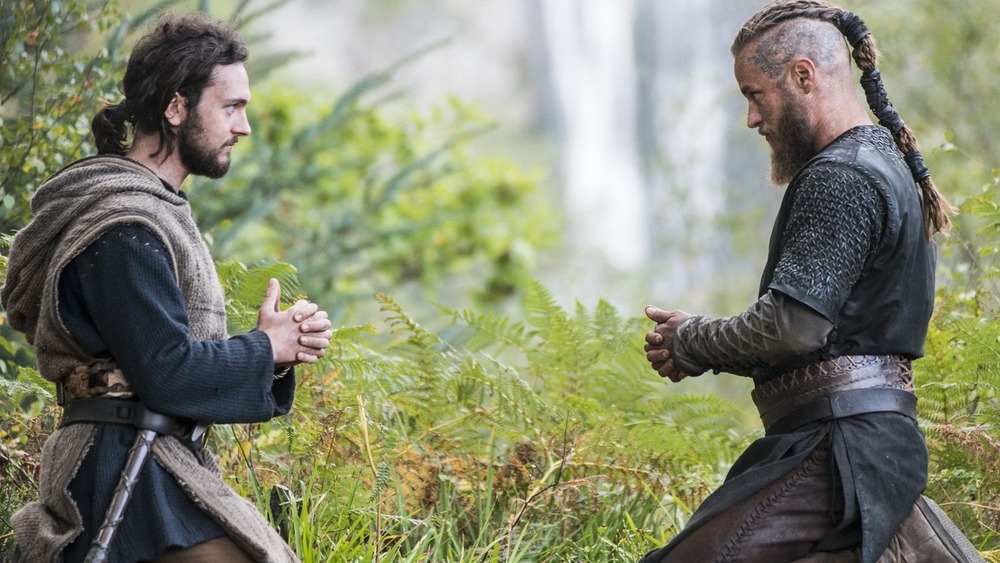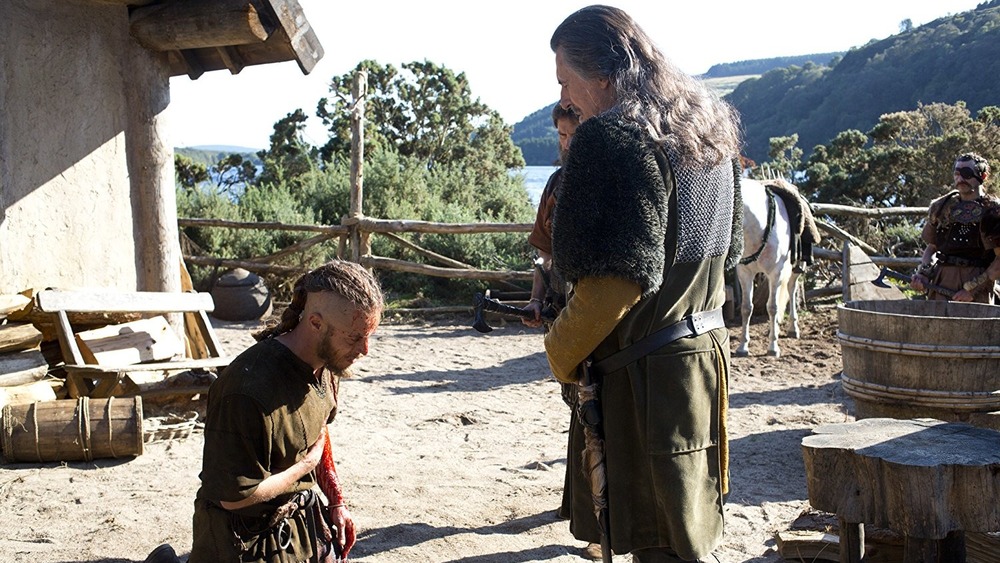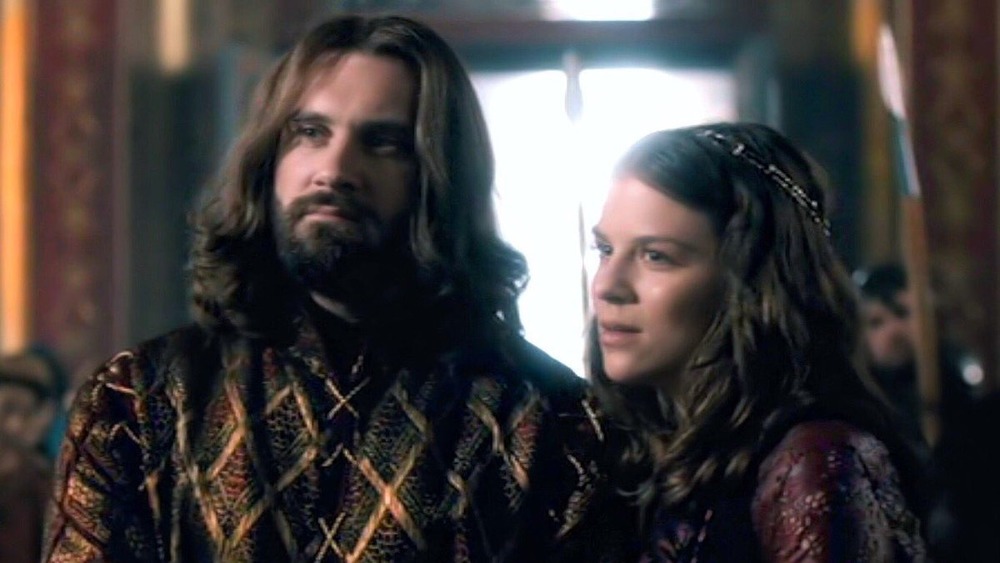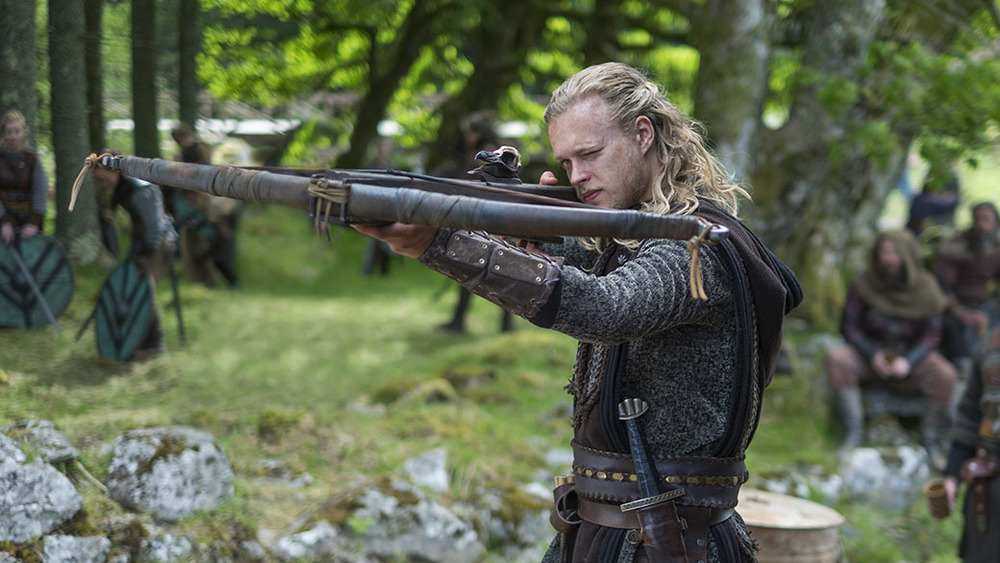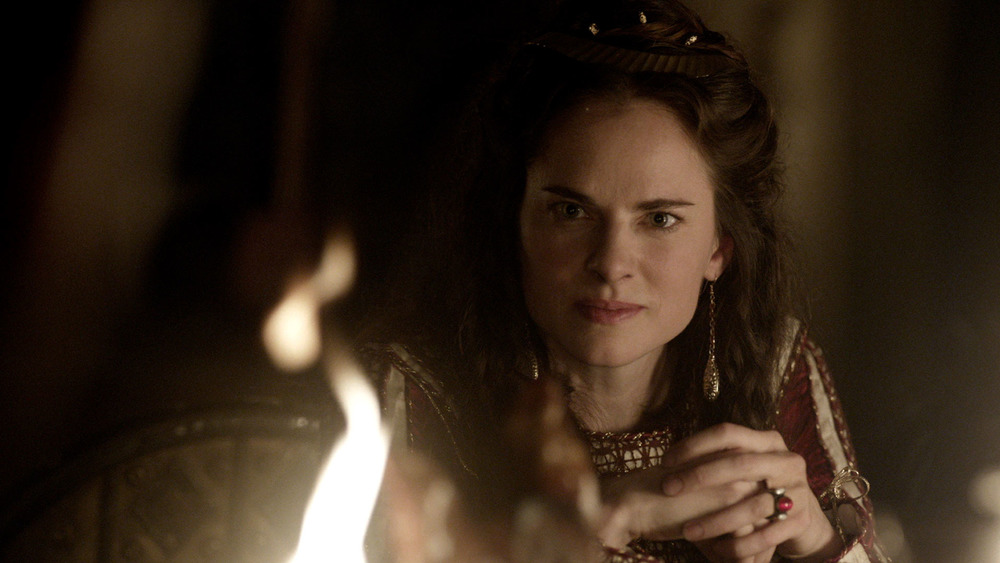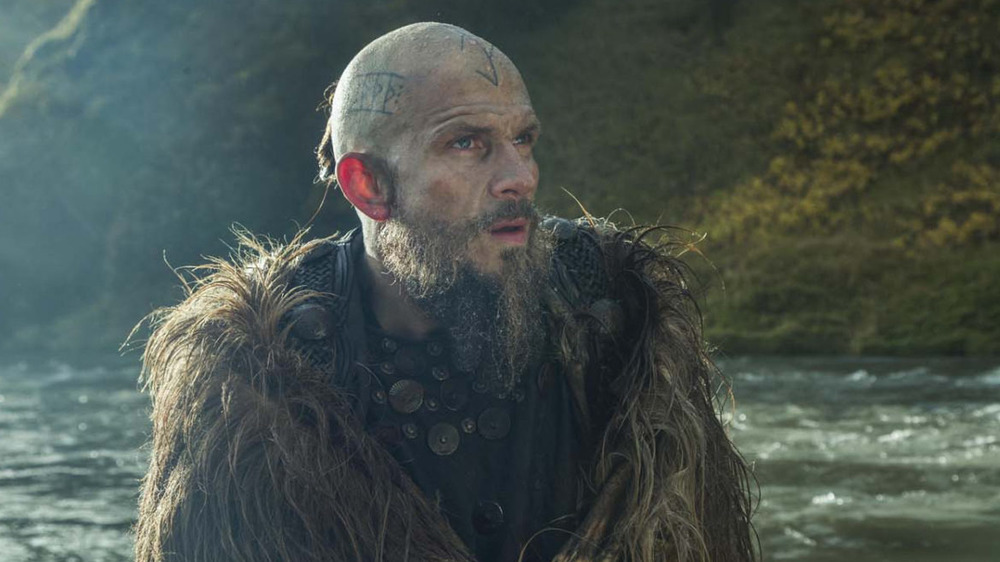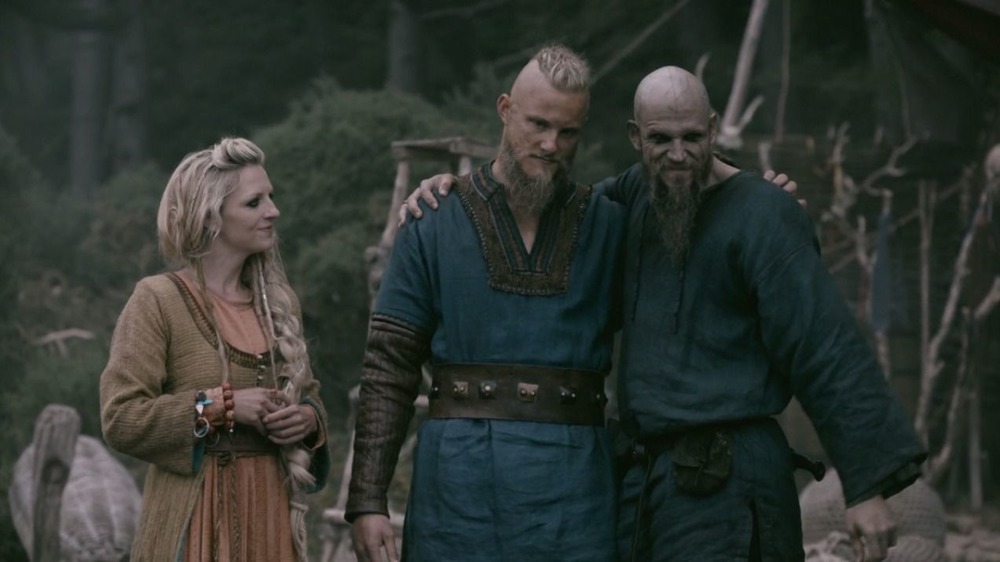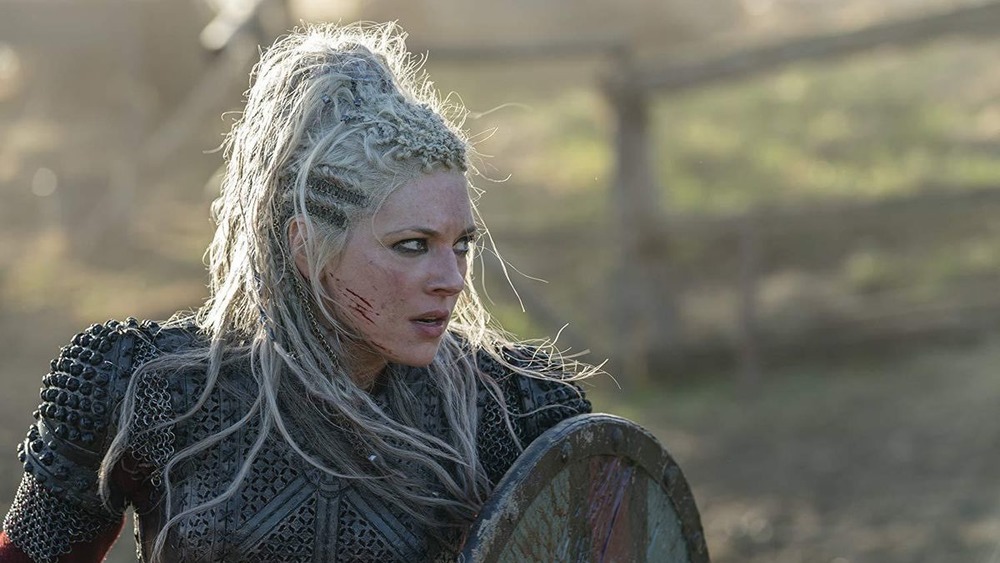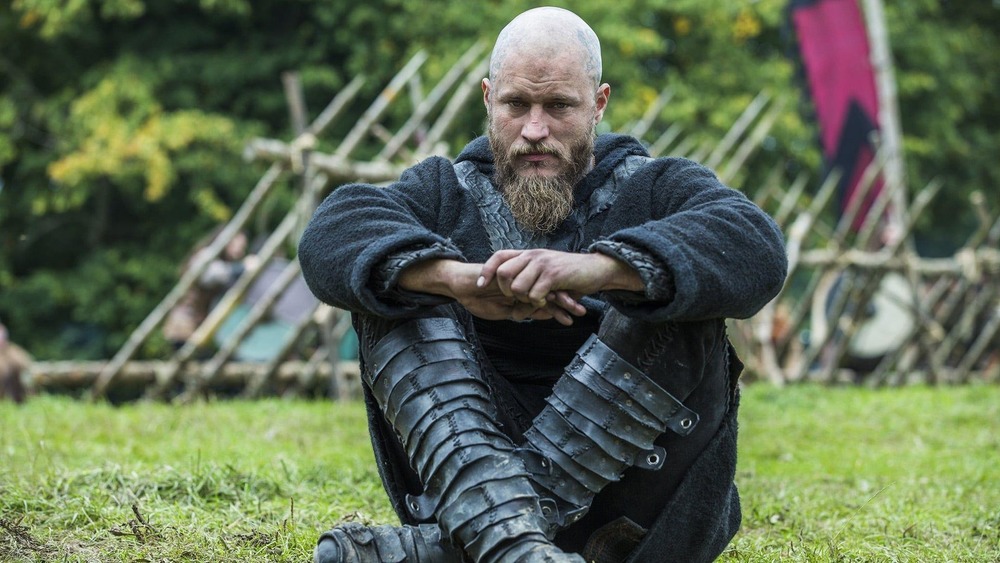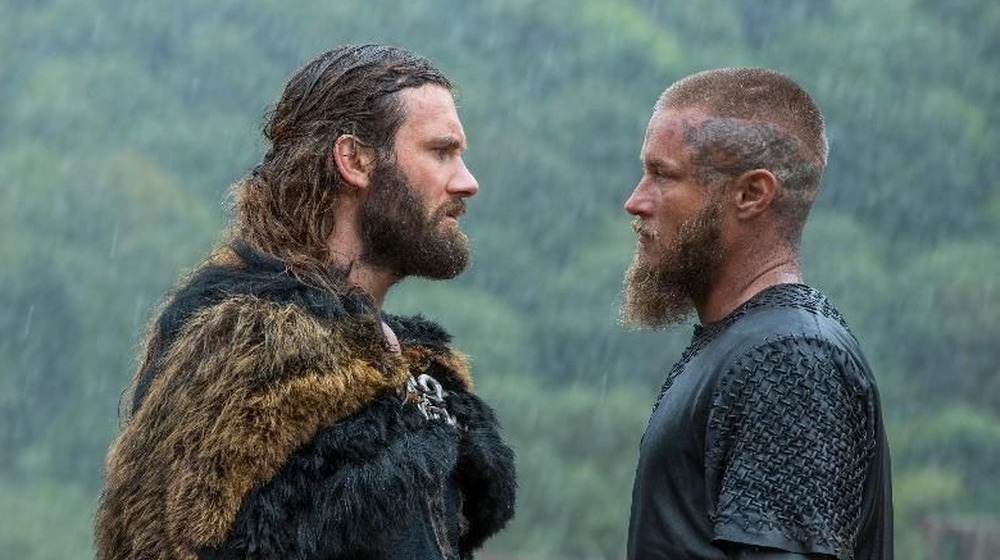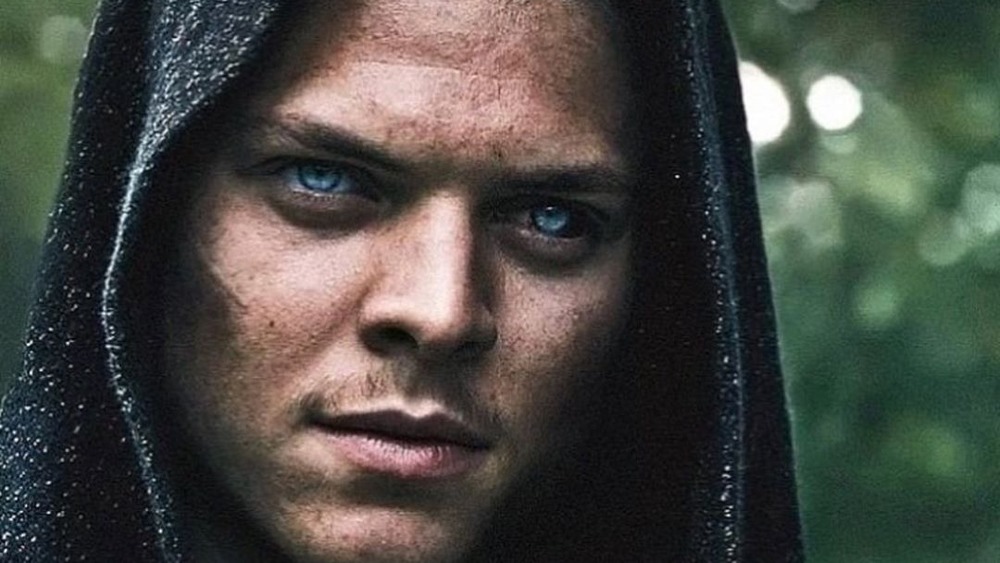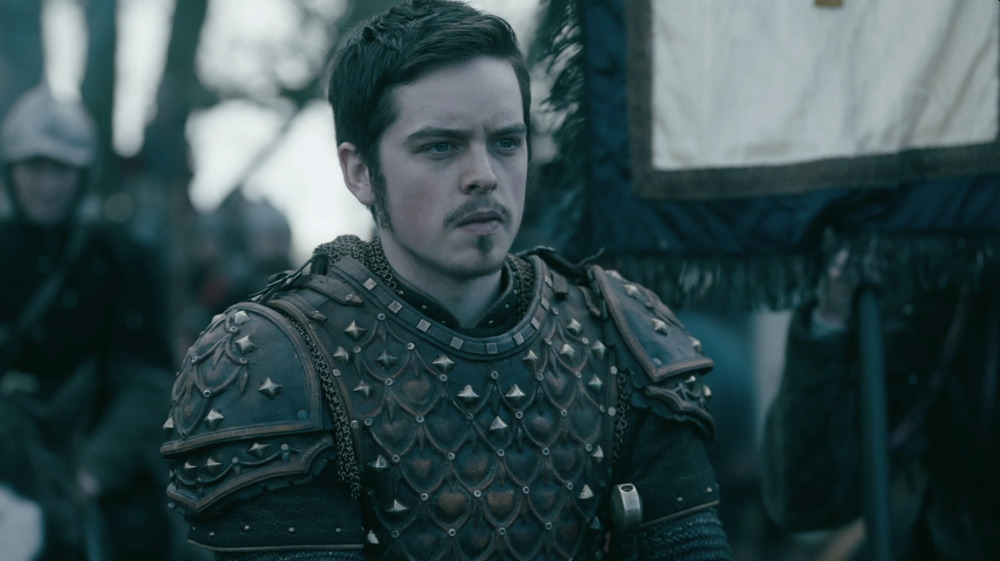Lines In Vikings That Mean More Than You Realized
As Ragnar Lothbrok rallies his warriors into battle against an unknown enemy on a strange land, he sums up being a Viking with one simple line: "We fight. That is how we win, and that is how we die." Strong words like this, from Ragnar and the people around him, hammer home the History Channel's historical fiction series, Vikings. In classic Viking fashion, these characters we romanticize do little more than fight, love, and die. But this quote captures the essence of being a Viking: Above all, their lives hinge upon pride in one's abilities and courage on the battlefield.
Vikings has a wide and loyal following, in part because of its epic battles, Machiavellian power struggles, and as much sexual intrigue as can be shown on basic cable. But alongside these vivid scenes runs great wisdom. Moreover, references to real history are buried in many lines, which often speak to the important role the Vikings played in forming the modern world. Let's dig a little deeper into those quotes and explore what they really mean.
"Like Loki the god?"
In the first episode of Vikings, Ragnar takes young Bjorn to meet the eccentric who will make the boat for their first western voyage: Floki. "Like Loki, the god?" Bjorn asks. "Yes, only different," responds Ragnar. When Bjorn asks how, Ragnar answers, "He is not a god." This line's full meaning becomes clear later on, as viewers watch the tension build between Floki's unflagging insistence in the gods' favor and Ragnar's insistence that Floki is simply a man. Ragnar's eventual belief that the gods don't exist, or are indifferent to their lives, infuriates Floki.
Floki's fervor fuels his actions, leading him to form his own religious colony in what we now call Iceland. He blames losses in battle on Ragnar's disbelief in the gods, Rollo's baptism in the Christian faith, and the sheltering of a Christian monk. This drives a wedge between Ragnar and Floki throughout Vikings, though their shared love is such that even when they hate each other, they are eternally loyal.
"Always remember to finish off your opponent, if you can."
Uncle Rollo trains Bjorn almost as much as his father, Ragnar, does — which is notable, as Rollo might even be his father. Parentage aside, Rollo is probably easier for him to relate to, and certainly easier to understand. One of the last lessons he gives Bjorn as the boy approaches manhood is, "Always remember to finish off your opponent, if you can. No man ever ran away with his entrails hanging to his knees, or his head cut off."
This advice sticks: Years later, Bjorn, having subdued the berserker assassin sent after him, makes sure to eviscerate the man. Similarly, Rollo, defending his new Frankish kingdom, tries to kill his brother, Ragnar. Rollo's reason? He says his brother is not defeated if he is still alive.
Throughout the series, nearly every enemy spared comes back to bite the hand of the merciful. And many, including Bjorn, come back from what should have been certain death. The Vikings really were tough — if the show is to be believed, they survived arrows to the chest and massive wounds!
"I don't want to sleep ... I want to feel alive."
Siggy Haraldson begins the series as the wife of the Earl of Kattegat and leaves as a babysitter. In between, she becomes Rollo's lover and a courtier. After losing her title, her husband, and her children, she still lives life to its fullest. A Viking stays in the fight against all odds.
One night in Rollo's bedroom, after discovering positive movement towards their ambitions, he suggests they go to sleep. Siggy replies, "I don't want to sleep ... I want to feel alive," and kisses him. Given the fact that there is almost as much sex in Vikings as killing, this is a universal sentiment. Gunnhild even paraphrases this quote to Bjorn after the first battle against Ivar for Kattegat.
The Vikings' desire to feel alive whether through battling, sailing, loving, or drinking in the great hall inspires the more subdued Christians: When Bishop Heahmund admits he would go to hell to be with Lagertha, he cites how alive she is as the reason.
"I hope someday our gods can become friends."
Ragnar kidnaps Athelstan from his British monastery. In time, the monk becomes a Viking, even embracing their gods. Yet on a raid back in England, Athelstan rediscovers his original faith after barely escaping crucifixion for apostasy. The conflict between Christians and pagans fuels much of the hatred and war in Vikings. Athelstan is a Rosetta stone between the two religions: He shows Ragnar virtue in Christianity, and King Ecbert of Wessex value in the Norse ways. He also shows fans the similarities between the two religions.
When Ragnar returns to Wessex and discovers that Athelstan is still alive, he strikes up a conversation with his old friend. "In the gentle fall of rain from heaven, I hear my God. But in the thunder, I still hear Thor. That is my agony," Athelstan says, as Ragnar escorts him through assassins set up by the Viking king Horik. Ragnar replies, "I hope someday our gods can become friends."
This conflict takes root in Ragnar's head. By the end of his life, he and Ecbert declare, in a drunken sharing of wisdoms, that both ideas of the afterlife are ridiculous — and, by extension, so are their religions. But that doesn't stop everybody else from fighting over belief.
"In my mind, I wish I had never left the farm."
Ragnar never wanted to be a ruler, nor did he hunger for power. He wanted, instead, to explore and do battle, to fulfill his desire to taste everything in this world. The life he goes on to have is one he's forced into, when Earl Haraldson destroys his farm. Though he expresses dissatisfaction with that simple path, his feelings end up changing. Exploring lands, women, philosophy, and mind-altering substances leads to his eventual madness, because it costs so much.
Looking back as he prepares for his final voyage, Ragnar realizes, "In my mind, I wish I had never left the farm." He has been humbled by his inability to endure the burdens of leadership, and longs for the good ol' days. Lagertha says she too wishes she had stayed on the farm and ended her life as a (warrior) farmer. The lesson: Appreciate the simple things.
"To our Frankish-Viking alliance, long may it continue."
At one point, Floki says Rollo may be more famous than all of them. He might be right: The real Duke Rollo's great-great-great-grandson was William the Conqueror. William's great-grandson, in turn, established the Plantagenets as the first family to rule all Britain. They remained in power until the Tudors took over.
French was once the language of nobility in England — a sign of the French and British tradition of cooperation that exists to this day. Vikings captures when this tradition began, when King Charles III of the Franks marries his daughter Gisla to Rollo, to stave off Viking attacks. After an initially cold reception, Gisla warms up to her husband and announces her pregnancy. Charles toasts this news: "Let me drink to the first child. To our Frankish-Viking alliance, long may it continue."
Of course, the French and British have also fought many battles. But in the process, they became two of the most powerful nations in the Western world, with a Viking-esque thirst for exploration and conquest that led to nearly unrivaled colonization. From this simple Frankish-Viking alliance came a key point in the evolution of the modern world.
"A Viking never gives up on his revenge. This is who we are."
Revenge drives Vikings. Though many Vikings consider revenge to be honorable, it leads to a number of downfalls. King Horik tries to kill Ragnar, in part because he wishes to avenge his army's loss to King Ecbert by killing Athelstan, who he holds responsible. When Ragnar kills Horik instead, he spares his son, Erlendur. Thus, Erlendur plots his vengeance, to be levied on Bjorn. He tells his wife, Torvi, who has fallen in love with Bjorn, that she must kill Bjorn, or he will kill her son. She begs him to give up, but Erlendur says, "A Viking never gives up on his revenge. This is who we are." Torvi kills Erlendur instead.
Revenge ripples through the years on Vikings. Lagertha's revenge-killing of Queen Aslaug leads to Aslaug's sons' desire to avenge their mother, which fuels Ivar's war of conquest. Ragnar's fear that his people's desire for vengeance will derail his plan to raid Paris leads him to keep the news that their colony in Wessex was destroyed a secret. This leads to Ragnar's final disgrace.
When Floki begins his new community in Iceland, he makes leaving behind the cycle of death and revenge a central tenet. But revenge ruins even that.
"To have been born a man."
Kwenthrith is a princess, a queen in exile, a co-queen, a queen outright, and an usurped queen, depending on the point in the show. She has, as is clear, a tenuous grip on power, made all the more fragile by the fact that she's a woman. Flaws that would be accepted in a man — irascibility, promiscuity, inconsistency — lead others to view her as weak. King Ecbert usurps the kingdom he had won "for her" with a sign-off from her cousin, Prince Wigstan. She attempts to kill Ecbert, but fails. Her last words have long-lasting relevance: "Do you know what would have been better for me? Can you even imagine?" she asks Ecbert. "To have been born a man."
It is ironic that "civilized" Europeans treat their women so poorly, while "savage" Vikings see women as leaders and equals (when compared to the Westerners, anyway). Consider adultery: Kings regularly cheat, but when Princess Judith does, she has her ears and nose cut off.
"Traveling somewhere that doesn't exist? Of course I'm coming."
Floki is Ragnar's closest friend. But Floki is more likely to act without a plan than Ragnar, because he believes the gods are controlling his fate. In time, Bjorn invites Floki to the Mediterranean based on nothing more than a fragment of an old map. He says he understands if the boatbuilder doesn't want to come. But what does loyal Floki say? "The lure of an imaginary land? Traveling somewhere that doesn't exist? Of course I'm coming."
This hunger for exploration is rooted in the real-life Floki, who was indeed a Viking who helped colonize Iceland. This is depicted in Vikings as the result of Floki giving up on the world and sailing aimlessly at the whim of the gods. He lands on the island thinking he has found Asgard. In reality, another Viking first discovered Iceland, while the real Floki led one of the first groups of settlers.
"The only way to tell if something is real is to sail there."
Ragnar hungers for exploration. By the story's end, it is clear that Bjorn Ironside and Ubbe have inherited their father's wanderlust. When Bjorn hatches the half-baked scheme of exploring the Mediterranean, Floki points out that nobody knows if anything exists there. "The only way to tell if something is real is to sail there," replies Bjorn. It was, of course, Bjorn's own father who partnered with Floki on the first great ocean voyage beyond Scandinavia.
While Floki's interest in exploration comes from a desire to see what the gods want, Bjorn wants to explore for the sake of it. Halfdan "the Black" admits to this desire to explore and aligns with Bjorn. If there is anything central to this era of Viking history as captured by the show, it's this sentiment. When Ubbe lands in America, he does so almost 500 years before Christopher Columbus.
"I am old enough to know that you can never say for sure what someone else will do."
Lagertha is tied three times to three earls, killing two and divorcing one. She beds a Saxon king who becomes her people's greatest enemy. As Queen of Kattegat, she takes up with a woman she is training. Then, she falls in love with a Christian warrior bishop. None of it is predictable.
That's how Lagertha rolls: She begins as a farmer and becomes a queen. In battle, she has killed many, but as a leader, she preaches mercy — mostly. Lagertha's life has been more unpredictable than any other. She wants to end her life as a farmer, but becomes a warrior once more to defend the farm. Moreover, she has been the victim of many betrayals. Kalf takes her earldom while she is raiding. Floki takes warriors to Iceland when she asks him not to. She is one of many betrayed by Rollo in Paris. Her lover Astrid marries her enemy, King Harald. But the greatest betrayal comes from Ragnar, her ex-husband, who beds, marries, and has children with another woman. Lagertha sums it up perfectly as she nears the end of her life: "I am old enough to know that you can never say for sure what someone else will do."
"Power is always dangerous. It attracts the worst and corrupts the best."
Ragnar Lothbrok does not seek power: He takes up leadership because the powerful don't want to let him do what he likes. He spends more time away from Kattegat than in it, despite being king, and when he's within it, he hides behind the walls. After his failure in Paris, he disappears for a decade. Ragnar sees his own corruption as a result of power. When he thinks of the people he has led to their deaths, it's too much for him to bear. Early on, there's even an exchange between Ragnar and Ecbert, in which they both admit they're corrupt.
When Bjorn becomes king of Kattegat, he finds that by meditating on a high point, he can still hear his father, Ragnar. Ragnar says, "Power is always dangerous. It attracts the worst and corrupts the best." This prevents Bjorn from succumbing to the hunger for power that destroys so many others.
"One must always think the worst, Ragnar ... That way you avoid too much disappointment in life."
Betrayal is commonplace on Vikings. Rollo betrays Ragnar by siding with Jarl Borg, then betrays him again in Paris. Later, Rollo joins Ivar against Bjorn and Lagertha. Harald Finehair kills his brother, Halfdan. Kwenthrith kills her brother. King Ecbert takes his son's wife Judith, and Judith kills her own son. Oleg kills or tortures his brothers.
Floki, being more realistic — or cynical — than Ragnar, understands blood betrays blood. Early on, when Rollo joins with Borg, Floki tells his king, "One must always think the worst, Ragnar, even of your own kin. That way, you avoid too much disappointment in life." He's entirely right: On Vikings, the shortness and uncertainty of life makes many so obsessed with achieving glory in the eyes of the gods (or God), they do terrible things against their own kin.
"What is real today might not be real tomorrow. But sometimes, we have to help it to shift."
Ivar the Boneless was a baby who, by Viking custom, should have been killed for his physical deformities. Yet he grows to be a great military strategist, leading to a rethinking of tactics throughout Vikings. In time, he finds new allies in Rus: Oleg and the child ruler Igor, Oleg's ward. Ivar tries to impart what he has learned over his life to Igor, especially as Igor laments the tyranny of his uncle, Oleg. On their army's way to Kattegat, which they seek to retake, Ivar tells the young Igor, "Nothing is ever permanent. Everything is always changing. Shifting. What is real today might not be real tomorrow." But, he adds, "Sometimes, we have to help it to shift."
The Western world was divided in the time of Vikings. The Vikings, with their seafaring and courage, left their mark everywhere from Scandinavia to the Mediterranean. European growth was made possible by this increased connection, which had world-shaping consequences. On the show, this all begins with Ragnar's own act of "shifting," when he first sails across the North Sea.
"We are all, all of us, devils and angels."
If anything holds true in Vikings, it is that everyone is capable of morality and immorality. Obviously, some lean one way or the other. Ragnar is adulterous, and he acts immorally in killing the man who brings the message that the colony in Wessex has been destroyed. He then tops himself by killing Yidu to hide this knowledge. Lagertha kills Aslaug, even though the woman surrenders. Ivar mostly acts like a devil, though he finds some redemption in his mentorship of Igor. Bjorn shows mercy, but it results in the death of his son and his mother.
Alfred tries to be an angel, though his mother and his grandfather sure didn't. As a young, intelligent king-to-be, he speaks to this human ambiguity: "We are all, all of us, devils and angels." Yet as Alfred begins to lead, he learns morality can be weakness.
In the world Vikings depicts, morality is complex. Moreover, moral choices have mortal consequences, so acting like a devil is sometimes necessary. In other cases, characters are so evil they act immoral without reason — this is epitomized by Ivar. Moral ambiguity, of course, still runs strong today. That's why this internal battle, fought by every character on the show, is so key to what makes Vikings compelling to us, more than a millennium after the events it depicts.
